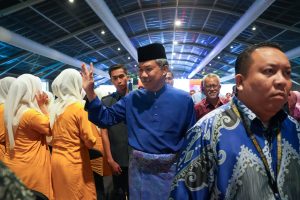Malaysia’s Foreign Minister Mohamad Hasan will lead a regional fact-finding mission to Myanmar next month, as the country’s military gears up for a planned election at the end of the year.
Malaysia’s state news agency Bernama reported on Friday that Hasan will lead a delegation from the Association of Southeast Asian Nations (ASEAN) to the military-ruled nation, most likely on September 19, ahead of the bloc’s next summit in October. The delegation will include representatives of the Philippines, which will take over the rotating chairmanship of the Southeast Asia bloc in 2026, Bernama reported.
“Previously, they (Thailand, the Philippines, and Indonesia) went separately, but we are practicing unity. We’re also bringing the Philippines because they will chair ASEAN in 2026,” Bernama quoted Hasan as saying. “We want continuity so that the incoming Chair knows what needs to be done and what actions to take. It should not be disjointed. We will continue and build upon what we’ve done.”
The visit will be just the latest in a long line of visits to Myanmar by ASEAN leaders and special envoys, aimed at pushing the country’s military to implement the bloc’s Five-Point Consensus peace plan. Formulated in April 2021, three months after the overthrow of the country’s civilian government, the Consensus calls for an immediate cessation of violence and inclusive dialogue involving “all parties” to the country’s conflict. However, the plan has been moribund, and the military government has been unwilling to engage in dialogue with opponents it views as “terrorists.” Instead, it has proceeded according to its own “roadmap,” the next step of which is a general election that the military plans to hold over several weeks in December and January.
On July 31, the National Defense and Security Council (NDSC) lifted the state of emergency that it imposed following its coup in 2021 in preparation for the polls, which have been roundly criticized by resistance groups, human rights organizations, and most impartial observers. The State Administration Council junta has now been dissolved and replaced by the National Defense and Peacekeeping Commission, which will remain in power until the formation of a parliament and government after the planned elections.
Mohamad noted the junta’s election plans, and said that he would seek clarification on the scope of the polls. After announcing the end of the state of emergency on July 31, the NDSC also announced local states of emergency in 63 townships, located in nine of the country’s 14 states and regions. The purpose of these measures is to “ensure the rule of law and stability in those areas, mostly under the control of armed opposition groups,” the Associated Press reported.
“The country has lifted the state of emergency, but these 63 areas remain under emergency rule,” the Malaysian foreign minister said. “I want to get a clearer picture to present to ASEAN leaders in October.”
There is little chance that the military’s planned election will be free or fair. According to critics, it is designed to preserve military rule behind a civilian façade, and so provide a route back to international acceptance akin to the staged transition that the Myanmar military initiated with the election of 2010. Much depends on how the election is greeted by ASEAN and its member states. In January, the bloc’s foreign ministers said that the military regime should prioritize peace, and that any election must be “inclusive” and “involve all stakeholders.” It repeated this during the bloc’s Foreign Ministers’ Meeting last month, when Mohamad Hasan emphasized that an election is not part of the Five-Point Consensus, and that the implementation of the plan should precede any election.
“We advised Myanmar that an election is not a priority for now, the priority is to cease all violence… so that all parties can sit together,” Mohamad told reporters on the sidelines of the meeting, as per Reuters.
While ASEAN has made its opposition to elections clear, it has done little to pressure the junta, beyond its current policy of excluding political representatives of the military regime from its summits. Moreover, it remains to be seen how it responds after it is presented with a fait accompli of the election. The Myanmar military is probably anticipating that a number of ASEAN member states, if not the Southeast Asian bloc itself, will accept the outcome and begin to engage more closely with whatever military-backed government emerges at the head of a new “civilian” government.

































